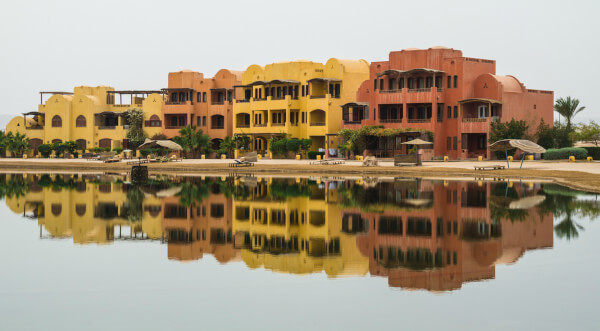Money in Egypt: Banks, ATMs, cards & currency exchange
Before you visit or make a move to Egypt, understanding the country’s currency is extremely important. Read this article to find out more.

There’s so much to see and do in Egypt, whether you’re spending your time in Cairo or heading out to see the pyramids. But whatever you do with your time there, you’ll need to make sure you have cash. Here’s a look at how to get the best out of Egyptian ATMs.
In the major cities - Cairo and Alexandria most of all - ATMs are in plentiful supply, and you should be able to find them in the usual places, such as at banks and in shopping centres. In smaller towns, they’re harder to find, though, and if you’re going further out of town it’s a lot trickier to track them down.
Use an ATM locator to find one near you. Here are locators or lists of ATMs for some of Egypt’s largest banks:
Whether your card works or not is largely based on what network it’s on. If your card is on a major network like Visa or Mastercard, you’ll probably be in luck - if not, just try a different machine. Here are locators for each of the major card networks.
One thing to be wary of when you travel is the number of digits in ATM PINs in the country where you’re going. While most countries worldwide use 4-digit PINs, some use PINs of 5 or 6 digits.
Check with your bank about the best option for you, but if you have a PIN of more than 4 digits, it might be worth changing it to a 4-digit PIN before you travel to Egypt. That could ensure that it’s usable at more ATMs.
Watch out for maximum cash withdrawal limits. You might only be able to take out a certain amount per day when you use foreign ATMs.
This might well be because of a limit set by your home bank, so you should check with them before you travel abroad to find out what your limit is. But it’s also possible that the ATM itself will limit the amount you can take out. If that happens, you might have to consider using an ATM at a different network - or simply waiting until the next day and getting some more out then.
Another reason to get in touch with your bank before you leave is to notify them of your travel plans. Banks keep an eye on where your card is used, and if they see it being used in Egypt without knowing that you’re there, they could assume that the card’s been stolen or cloned, and block it. So make sure that doesn’t happen by telling them where you’re going.
ATMs can be a godsend to travellers in need of cash, but they don’t always come cheap. Here are the fees that you might encounter.
This one isn’t just an Egyptian issue. Whenever you use an ATM abroad, there’s a chance the machine will ask you whether you want to use your home currency or the local currency, in which to make the transaction.
If you choose to be charged in your home currency, the machine will convert the money at an exchange rate that it sets itself, using a method known as Dynamic Currency Conversion (DCC). But this Egyptian ATM will probably use a bad exchange rate: because you’re not a customer there so they won’t care about keeping you happy. Some reports say the exchange rate can be as much as 18% worse via DCC.
Always choose to be charged in the local currency - Egyptian pounds, in this case - in order to avoid DCC. You’ll likely get a far better exchange rate - not the mid-market exchange rate, but a much better deal for you.
Unfortunately, DCC isn’t the only fee to watch out for. Your home bank might charge a fee for international ATM use - many do. There might also be both a fixed fee to pay and a percentage of the withdrawal amount.
And even if the ATM doesn’t charge you through DCC, there could still be a fixed cost from them as well. Keep a close eye on what the machine says to you - do it in English if that’ll help you - and know where a few different ones are situated, so you can compare and contrast.
Totally free? It’s unlikely. But it’s worth asking your home bank if they have any partnerships with Egyptian banks, which could mean reduced or even free ATM use at their machines.
Even in that case, though, unless you’re being charged the mid-market exchange rate, you can’t really call an international ATM withdrawal free as you’ll be losing out via the exchange rate.
With so many potential fees to pay at ATMs, it’s always a good idea to try and minimize them. Here are some tips:
And whatever you do, don’t forget about the exchange rate, which is the other key way banks make money off you when you travel. The mid-market exchange rate is the only rate it’s really fair to use, but banks don’t tend to use it when they give you money.
Wise has a different policy: it always uses the mid-market rate. So if you need to get money into Egypt from a foreign account, it’s likely a cheaper option than using a bank. And with a borderless multi-currency account from Wise, you can keep money in Egyptian pounds, and dozens of other currencies, for as long as you like. There’s no monthly fee. Save yourself the hassle of worrying about the exchange rate, and open one now.
To make things even easier, consumer debit cards are currently being rolled out to borderless customers - so you might not even have to use your bank card at foreign ATMs as much as you thought.
ATMs abroad are often a headache, but with the right forward planning, they shouldn’t get in the way of your trip to Egypt. Good luck with your money there and have a great trip.
This publication is provided for general information purposes only and is not intended to cover every aspect of the topics with which it deals. It is not intended to amount to advice on which you should rely. You must obtain professional or specialist advice before taking, or refraining from, any action on the basis of the content in this publication. The information in this publication does not constitute legal, tax or other professional advice from TransferWise Limited or its affiliates. Prior results do not guarantee a similar outcome. We make no representations, warranties or guarantees, whether express or implied, that the content in the publication is accurate, complete or up to date.
*Please see terms of use and product availability for your region or visit Wise fees and pricing for the most up to date pricing and fee information.
This publication is provided for general information purposes and does not constitute legal, tax or other professional advice from Wise Payments Limited or its subsidiaries and its affiliates, and it is not intended as a substitute for obtaining advice from a financial advisor or any other professional.
We make no representations, warranties or guarantees, whether expressed or implied, that the content in the publication is accurate, complete or up to date.

Before you visit or make a move to Egypt, understanding the country’s currency is extremely important. Read this article to find out more.